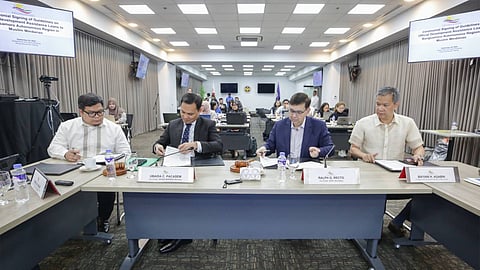
- NEWS
- the EDIT
- COMMENTARY
- BUSINESS
- LIFE
- SHOW
- ACTION
- GLOBAL GOALS
- SNAPS
- DYARYO TIRADA
- MORE

The Department of Finance sees further socioeconomic progress in the Bangsamoro Autonomous Region in Muslim Mindanao (BARMM) following its approval of the guidelines for official development assistance (ODA) loans to the region.
As co-chairpersons of the Intergovernmental Fiscal Policy Board, Finance Secretary Ralph Recto and Bangsamoro Government Minister of Finance, Budget and Management Ubaida Pacasem signed the document for the ODA guidelines on Tuesday.
“With these ODA guidelines, we are equipping the BARMM with the tools needed to shape its future and write its own success story,” Recto said.
Limitless opportunities
“This unlocks limitless opportunities for the BARMM — from infrastructure development to socioeconomic programs that create jobs, boost incomes, and lift communities out of poverty,” he added.
The ODA consists of loans from foreign governments and multilateral institutions.
Under the Bangsamoro Organic Law, the Intergovernmental Fiscal Policy Board is tasked to resolve issues in revenue generation and fund management of BARMM.
To ensure sustainable financing, the ODA guidelines allow the Bangsamoro Government to tap ODA loans only after it has exhausted other financial instruments in the capital market, and specific ODAs must also contain a grant element of 25 percent.
Moreover, the Finance Department said ODA funds cannot be used for telephone programs, projects required by law to be handled by the private sector, or for financing private corporations that have access to commercial credit.
Enabling BARMM to adopt technologies
Apart from the monetary aid, Recto said the ODA guidelines will enable BARMM to adopt technologies and gain knowledge and skills from global industry leaders.
According to the Philippine Statistics Authority, BARMM’s poverty incidence dropped from 23.5 percent last year from 52.6 percent in 2018.
“Diminished conflict has empowered farmers and entrepreneurs to invest more in their ventures, resulting in increased incomes and generating more income opportunities for workers,” World Bank Country Director for Brunei, Malaysia, the Philippines and Thailand Ndiamé Diop said.
